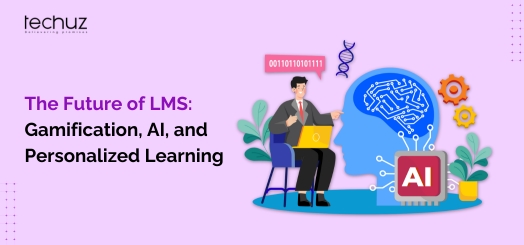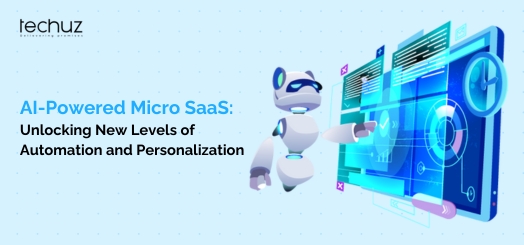Posted on
December 2, 2024
Read time
 11 mins read
11 mins read
In the last few decades, education has moved from the traditional classroom model through to online learning venues and Learning Management Systems (LMS). Innovations such as gamification, AI, and personalized learning will, in the near future, propel LMS even further into new technology integration. No longer will what learners do with content, how instructors follow progress, or how organizations design and implement a learning strategy be the same.
Such changes are indeed going to be momentous, as they have the potential for widening the possibilities of the future in education-making delivery and engagement with learning across the board more effectively in monitoring and involving that learning.
Table of Content
What is an LMS?
But before we dive into the wide horizon of future opportunities, it is wise to try and refresh some memories about what an LMS actually is. A Learning Management System (LMS) is basically software through which educational content and training programs can be delivered, managed, or tracked. Organizations and institutions, such as schools and universities, use LMS platforms to house courses, perform assessments, review student progress, and provide the experience as a whole. LMS’s afford a central space to deliver content, collaborate and assess.
What LMSs can manage today is pretty much all above mere course management. They are gradually transformed into dynamic interactive ecosystems aggregating technology and pedagogy to provide the learner with a better experience.
The Future of LMS: A Blend of Gamification, AI, and Personalized Learning
1. Gamification: Making Learning Enjoyable and Useful
Gamification in LMS is probably the most interesting trend within the whole education system. Gamification here consists of the use of rewards, levels, points, badges, and leader boards, as well as other game-like elements, in learning processes. The idea is to make learning more of an interactive experience and engagement; it motivates learning.
Gamification is the Future of LMS
It is as good as having more enthusiastic learners in its traditional classroom space offering course materials that are generally uninspiring through gamification. Gamification will definitely include all its elements into course design in the future of LMS.
This is how gamification will change the future LMS:
- Present Motivations: Getting motivated comes with learners being encouraged by unlocking achievements, getting rewards, and leveling up. Progress with accomplishments, motivate learners and entice them to keep having their way to the course materials.
- Immediate Feedback: Gamified activities such as quizzes, challenges, badges assure instant feedback, which for students is critical in understanding their current level of achievement and what to improve on. A few gamified evaluations ensure their co-learners are with them in the endeavor of learning.
- Individualized Challenges: Examples of this are LMS gamified to each learner’s level. In this regard, every learner enjoys the customized experience devoid of feeling either overwhelmed or under-stimulated.
- Partnering and Competing: Leader boards, team-based projects, and group challenges cultivate collaboration and healthy competition among learners. These elements enhance the social learning experience, peer interactions, and team skills.
Examples of Gamification in Learning Management Systems
Countless educational institutions and organizations are already including gamified aspects in their LMS. The gamified learning environment created with Duolingo, Khan Academy, and Coursera is one of immersion, interactivity, and engagement.
Take, for example, language learning using Duolingo, where levels, points, and streaks motivate students to continue their learning journey. The same model of perseverance is extended to Coursera, where students earn badges or certificates on achieving the defined learning outcomes.
As it develops, experiential gamification will incorporate more advanced immersion technologies such as virtual reality and augmented reality into the learning experience.
AI is doing great wonders in various industries, and of course with the future of LMS. It has the potential to entirely transform the way learners interact with LMS, throwing up intelligent modes of streamlining learning, improving outcomes, and personalizing the experience.
2. How AI Will Influence the Development of Future LMS?
Enhanced Learning
Personalized Learning Pathways: One of the most important ways in which AI would affect the future LMS is to deliver personalized learning pathways. By evaluating a huge database of student information-including learning pace, strengths, weaknesses, and preferences-AI algorithms can provide customized courses, resources, and related activities to learners, encouraging learners to work at their own pace on those areas for improving their skills.
Automated Content Recommendations: The AI engines will be able to recommend relevant resources to students studying the particular course based on their own learning history, interests, and preferred learning patterns. For example, if a custom LMS software development uses AI, then students can be offered with articles, videos, or quizzes regarding the currently running module or challenge. Then, this is going to really engage the students with those relevant materials.
Chatbots and virtual tutors
AI-powered chatbots could provide students with real-time answers to their queries besides helping virtual tutors explain concepts, giving extra exercises, and attending to individual learning needs all outside normal class hours. This serves to ease the workload on instructors since students would have the benefit of getting assistance when needed.
Predictive analytics
AI can analyze data related to students and predict results as well as possible learning reductions. In addition to other patterns, such as quizzes completed, courses completed, and levels of engagement among students, it uses this information to be able to predict which students are likely to struggle and appropriately intervene. Instructors get to know what needs to be paid attention to even before some issues develop.
Natural Language Processing
AI’s new NLP capabilities will greatly enhance the interaction between learner and LMS. It not only allows the LMS to understand and answer student queries through natural language, but it also has the following feature, thereby creating a more conversational and intuitive learning experience: Text-to-Speech tools. So, the person using this platform does not have to face any difficulty in understanding.
AI and Automation in Grading
As managing students’ exam grades, more of the assignment burdens are now alleviated by introducing AI to manage most administrative work, such as grading. An LMS would automatically grade assignments, quizzes, even essays, according to a set rubric—thus speeding up evaluation processes and ensuring consistency. AI interpretation of evaluation processes also produces exemplary feedback for students concerning them.
3. Personalized Learning: Customized Education for Every Learner
To most people, personalized learning is one of the few phenomena in learning that will change the future of LMS vastly. It is no longer the same as traditional one-for-all education, but learning will now be a perfect match for every individual-according to their requirements, preferences, and objectives.
Why Personalized Learning Matters?
In personalized learning, the learning paths would be totally individualized to each student. It would allow the teacher to address the different learning styles and needs so that every single learner can have opportunities to succeed.
Personalized learning in the LMS will grow further, flexibly and adaptively. Important features for this are:
- Learner-Centric Content: Personalized learning in the LMS is not only about course materials but brings different types of customizations including the types of assessments or mode of instructional delivery, such as video, quiz, article, and feedback mechanisms, by ensuring that individualized effective learning pathways exist for each learner.
- Adaptive Learning Technologies: Adaptive learning systems employ algorithms to shape the learning experience differently based on individual performance. For instance, when the student fails to understand a particular concept the LMS will offer more resources, explanations, or practice problems on the topic. Similarly, if the learner excels with the pattern, the system will offer higher-stage problems.
In fact, Personalized learning LMS platforms have begun analyzing data drawn from a learner’s progress and behavior. Solving that knowledge base, a teacher can make data-driven inferences as to which kinds of interventions are needed for every learner. This can mean changing the pace of a lesson, suggesting additional resources or advice, or possibly even offering personalized coaching.
Besides Choice and Autonomy, personalized learning put the students in more power to take charge of their education. Flexible design of courses allows them to decide what and when to learn and makes it a more self-directed endeavor. This amount of independence increases student interest and also promotes internal motivation.
Importance of Artificial Intelligence in Personalized Learning
AI development is of great value for personalized learning. The extent to which it can be used to help LMS platforms gather information, analyze learner behavior, and provide learning experiences that “fit” an individual-only experience is almost unbelievable. In fact, combining AI and personalized learning will enable even more effective learning outcomes because content, resources, and assessments can be matched to learner profiles exactly.
4. Merging Gamification, AI, and Personalized Learning: An Integrated Approach
- Known in future classrooms: LMSs entwined together with gamification, AI, and personalized learning mark what learning spaces must have to hype and spice up. All three elements will harmoniously provide:
- An Engaging Experience: While learners are kept entertained and occupied with gamified activities, their interaction with AI will ensure that what they learn is personalized and suited to their needs.
- Effective Learning Routes: For instance, AI-driven dynamic algorithms will personalize students’ own learning pathways and serve their application of obtaining the right from most relevant materials and resources. On top of that, these gamified challenges and rewards tend to keep the student actively moving.
- Best Outcomes: Self-direction by personalized learning places the learner’s focus on exactly those things they need most, at their own pace. Gamification and AI do provide real time feedback and support, which all result in an overall great combination of better learning outcomes coupled with satisfaction for the learner.
Conclusion
The LMS future is incredibly enormous. It would be more gamified, AI based, and personalized to give learners a more engaging, effective, and individualized learning experience than ever before. With the revisit of these happenings, LMS platforms will unfold create-at, highly intuitive, intelligent, sorts of possibilities in education. As we embrace these innovations, the future of LMS will not change only learning methods; it will equip educators with powerful tools for student success. In the end, a fully personalized approach towards the education learning experience will be made available to all.
Techuz believes in creating high-end EdTech and e-learning solutions, mainly emphasizing developing gamified learning platforms. Our designers and developers have extensive experience in web development for gamified approaches to ensure that your content and courses achieve maximum effectiveness for your learners.
FAQ
1. What is Gamification in Learning Management Systems (LMS)?
Gamification refers to integrating game elements (like points, badges, leaderboards, challenges, and rewards) into LMS platforms to make learning more engaging and motivating. By applying game mechanics, LMS can encourage learners to complete tasks, track progress, and achieve goals in an interactive and enjoyable way.
2. How does Gamification enhance the learning experience?
Gamification makes learning fun and competitive, which increases learner engagement and retention. It encourages healthy competition, fosters collaboration, and provides instant feedback. This approach motivates learners to stay involved in the content by setting clear goals, rewarding achievements, and offering recognition for their efforts.
3. What part does Artificial Intelligence (AI) play in regard to the future of LMS?
AI improves the learning experience. It provides suggestions that are personalized and aligned with the individual’s methods of learning and automates labor-intensive work. AI acts via chatbots in giving real-time assistance to learners, and machine learning algorithms identify patterns in learner data, and suggest courses, resources, and learning paths relevant to respective users.
4. What can AI just do in terms of individualizing the learning experience for every user?
Artificial intelligence personalizes learning through behavioral tracking by the learner and gathering insights on that learner’s preferences and performances to recommend a particular resource or adjusting learning paths. Here, for instance, if a learner is finding a certain aspect rather challenging, then the AI would know about it and suggest specific resources or learning activities to help that learner with his or her understanding of that concept. This method of personalization assures engagement and success for the learner since it responds to their individual needs.










